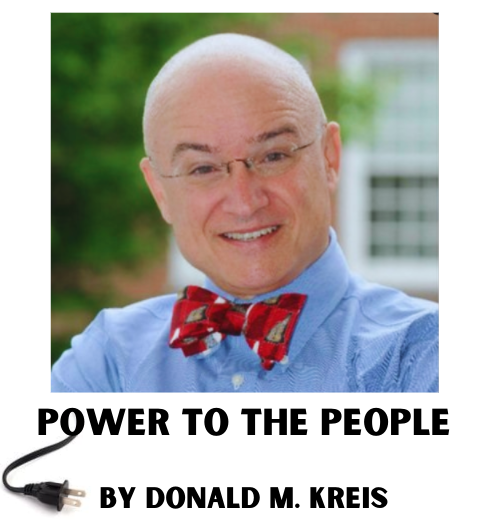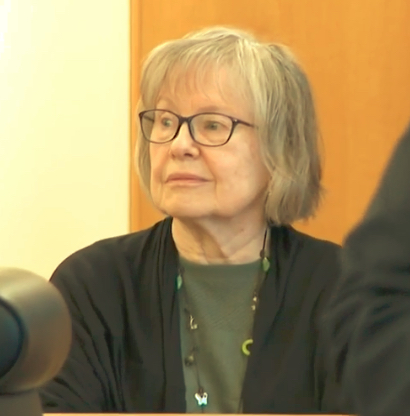Power to the People is a column by Donald M. Kreis, New Hampshire’s Consumer Advocate. Kreis and his staff of four represent the interests of residential utility customers before the NH Public Utilities Commission and elsewhere.
By Donald M. Kreis, Power to the People
My car recently acquired a spiffy new yellow inspection sticker for 2023. You can check it out as you breeze past me since I like to drive at 55 on the interstate, the better to get great mileage out of my Prius.
So, this is as good a time as any for me to incur the wrath of every police officer in New Hampshire.
Our electric utilities are in a constant struggle with their mortal enemy: trees. Every year, the utilities spend millions of dollars on what is known in the trade as “vegetation management.” Mostly this amounts to driving around in bucket trucks and cutting back tree branches that are poised to topple onto electric lines when the wind blows.
Gas utilities are impervious to trees, but they too often have to work in the streets. They dig up old pipelines to replace them, thus reducing leaks. They install new pipelines in neighborhoods that are growing.
All of these activities require flaggers who can direct traffic so the utility workers can do their pruning and digging. The objective is to keep the utility workers, and those passing by, as safe as possible.
Over the years, many if not most municipalities in New Hampshire have adopted the practice of requiring the utilities to hire the local police force to do the flagging. It appears to have become a welcome source of overtime for police officers.
Perhaps these municipalities, police departments, and police officers are under the impression that when they send the bill for these services to Eversource, Liberty, the New Hampshire Electric Cooperative, and Unitil, the money comes from the wealthy owners of those companies. Not so.
In reality, the money comes straight out of the pockets of ratepayers.
At the Electric Cooperative, the utility is owned by its customers so the ratepayers and the shareholders are the same people. The other three companies, investor-owned utilities all, routinely get the approval of the Public Utilities Commission (PUC) for recovery of vegetation management costs and other maintenance expenses from customers.
A recent case in point: On April 25, the PUC approved a request from Liberty Utilities to recover more than $3 million in vegetation management expenses incurred last year – well north of the $2.2 million budgeted for these costs.
According to Liberty’s witnesses, the utility was over budget on traffic control costs in 2022 by nearly $254,000 – with more than half of that over-spend accounted for by the Town of Walpole and its police department.
Who doesn’t love Walpole? Academy Award-winning documentary filmmaker Ken Burns lives there. The food and the chocolate at Burdick’s are excellent. The view of the Connecticut River Valley from up on Ramsay Hill Road is splendid.
But, still: According to written testimony filed by Liberty, “Walpole Police significantly increased their hourly rates and location requirements for traffic control as compared to previous years. In 2022, Liberty was billed approximately $150,000 for traffic control by the Walpole Police Department, about $2,700 per mile. In comparison, 2017 was the last time the 12L2 [one of the utility’s lines in town] was trimmed and the total traffic control costs in Walpole were about $32,000, or about $582 per mile.”
The Legislature has been trying to do something about this problem since at least 2010, to no avail. In that year, and again in 2015, legislators introduced a bill that would require municipalities to apply the same standard used by the state Department of Transportation in determining when it is necessary to use police officers on flagging details.
In the 2015 session, we saw some action: the creation of (pause for drumroll) . . . a study committee! The study committee, in turn, recommended legislation to “limit the use of police to only when specific safety concerns occur or if qualified flaggers are not available.”
It took seven years – until 2022 – but, thanks to Representative David Bickford of New Durham, such a proposal is now pending, in the form of House Bill 526. Bickford is well-qualified to pursue such an initiative because, as a former member of the New Durham selectboard, he understands municipal government.
HB 526 is a distinctly modest initiative – adopting the suggestion of the study committee, it would merely limit the use of police officers as flaggers to situations in which “there are specific safety concerns about the project or if qualified traffic flaggers are not available.” But judging by the reaction to the bill at hearing in February, you’d think Bickford was trying to defund the police altogether.
Fully 230 people took positions via the Legislature’s online comments portal. One person (me) favored the bill; 229 were opposed. About 60 of those opponents submitted written comments.
Here’s an excerpt from a typical comment:
“I think this bill puts public safety at risk. Police officers should always be preferred to work road construction details over flaggers. Many flaggers are convicted felons, child predators. The flaggers are often not members of the community they are working in, and do not know the town’s geography.”
Here’s another:
“A good portion of the ‘Flaggers’ are criminals/felons/ sex offenders. These are not the types of people that I want in neighborhoods where my children and schools may be. I would much prefer to have Police Officers handling these duties as they are not only equipped to deal with traffic control, but any other issue that may arise in the area or while handling their primary duty.”
Get the idea? According to opponents of HB 526, it’s either cops or criminals working those traffic details.
HB 526 has been retained in committee, which means it will receive further consideration later this year. I’m pretty sure Eversource, Liberty, the Electric Co-op, and Unitil have no interest in hiring criminals to protect their job sites, and I think ratepayers deserve a break here.
So I hope the bill passes. Meanwhile, rest assured I will be obeying the posted speed limit and thanking any police offers I may encounter for their service to our communities.
Defund the police, a little, to help ratepayers.




